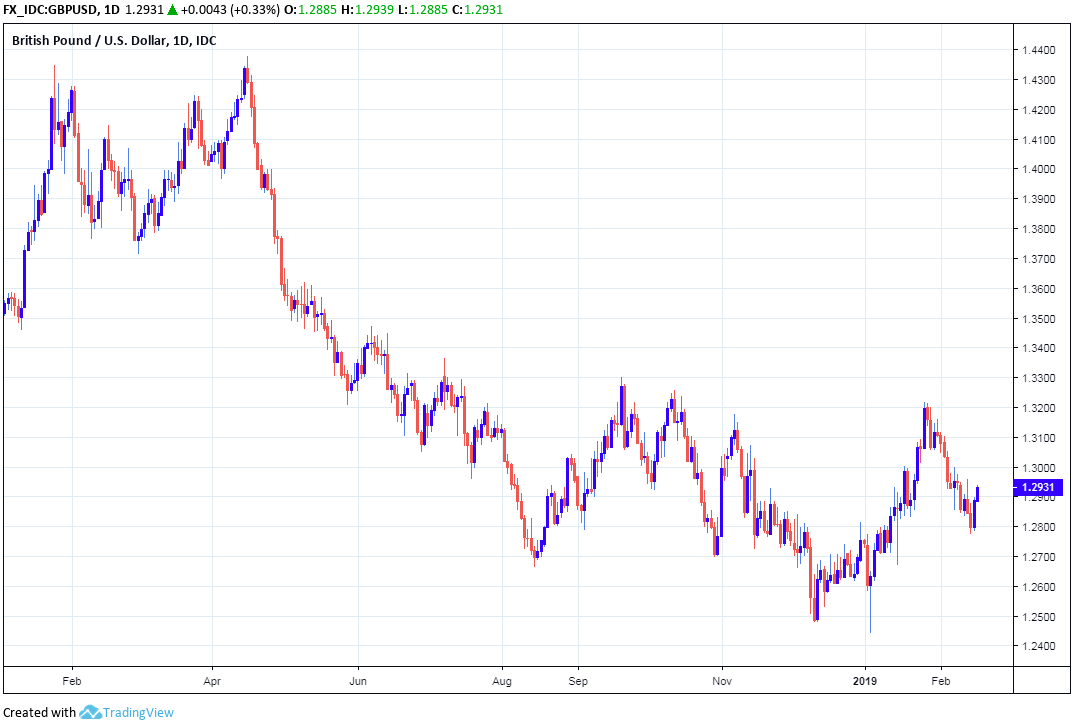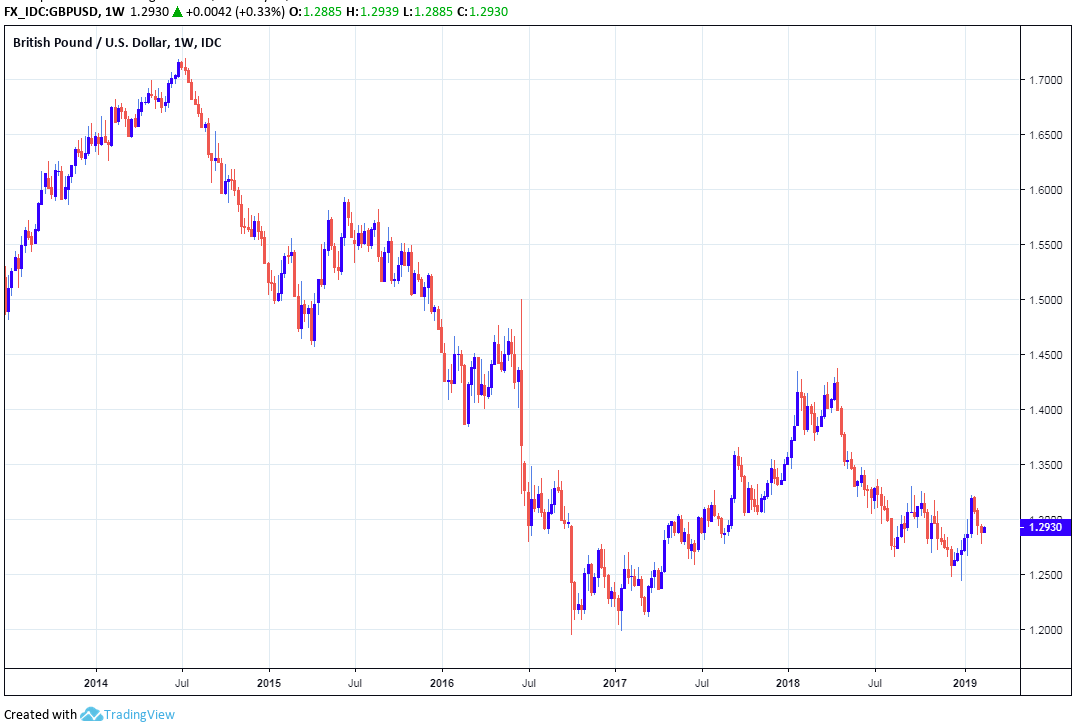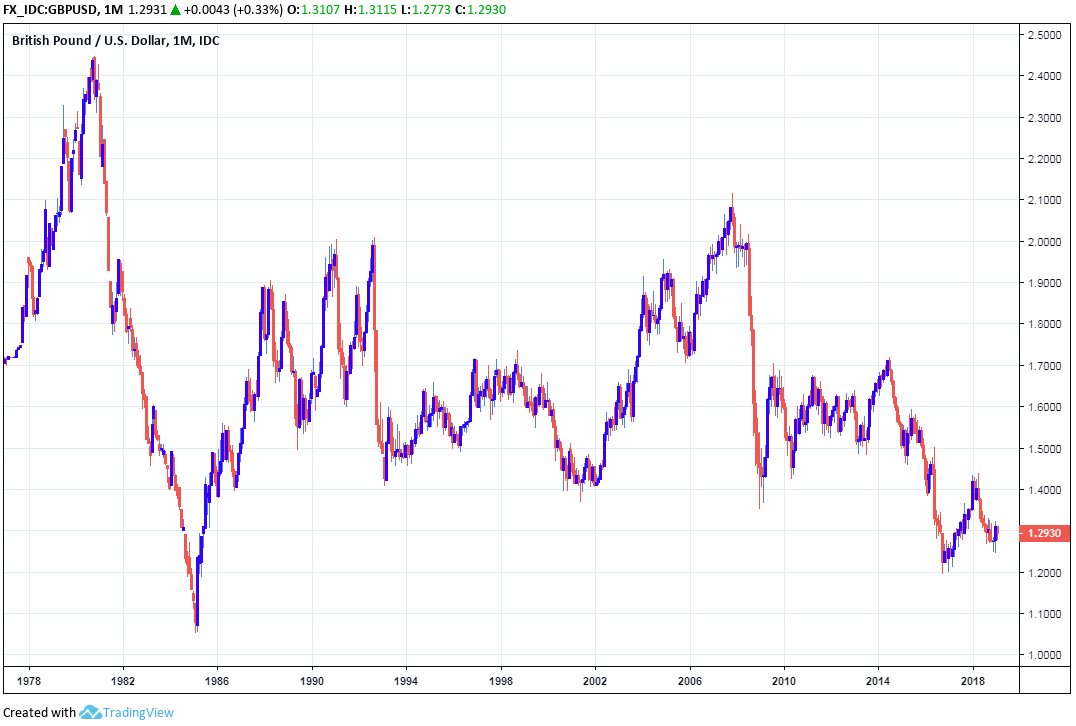Pound Sterling Now a "Do Not Touch" Currency as No Deal Brexit the Most Likely Scenario says BMO
- Written by: James Skinner

© IRStone, Adobe Stock
- GBP a "do not touch" currency ahead of no deal Brexit says BMO.
- Accidental no deal Brexit now BMO's base case outcome for GBP.
- GBP to fall 8% against USD as UK and EU head go over "cliff edge".
The Pound could fall by as much as 8% against the Dollar over the coming months, according to analysts at BMO Capital Markets, who say Sterling is now a "do not touch" kind of currency because a no deal Brexit is the most likely outcome from the saga playing out in parliament.
BMO's latest forecasts for the UK and Pound Sterling come after a week that saw the government defeated in parliament once again, which has stoked scepticism over whether the EU will provide concessions in the Brexit negotiations given the low level of domestic support commanded by the Prime Minister.
"We have hardened our opinion that both the EU and MPs will find themselves either unwilling or unable to “blink” in order to prevent a “no deal” Brexit. This is not set in stone, and 42 days are a long time in European politics. Still, this is how we see the landscape as of Feb-15-2019," says Stephen Gallo, European head of FX strategy at BMO Capital Markets.
Prime Minister Theresa May asked the House of Commons last week to show symbolic support for her efforts to continue negotiating with the EU by voting with a majority to approve a non-binding motion setting out the path ahead, although it failed to secure the backing of enough MPs.
This was after pro-Brexit lawmakers abstained from the ballot due to fears the wording of the motion would amount to an instruction that government avoid a no deal Brexit at all costs including by exending the Article 50 exit period if it becomes necessary.
Three subsequent amendments to the motion brought forward by the opposition and pro-remain rebels in the Conservative Party were also defeated. One had sought to compel the government to extend the Article 50 period if a deal is not reached by February 26.

Above: Pound-to-Dollar rate shown at daily intervals.
Unfortunately for Sterlng, the message analysts and economists have taken from last week's events is that the EU will now be even less likely to offer concessions over the Northern Irish backstop because it's not certain that even those would be enough to get the Withdrawal Agreement approved by parliament.
"Britain itself faces an appalling trade-off. Does it sacrifice some short-term economic pain in return for increased sovereignty, or does it renounce increased sovereignty in return for more economic certainty?," Gallo writes in a note to clients. "With Brussels’ stance and the precarious Westminster parliamentary arithmetic in mind, we think there is a very low chance of the EU agreeing to legally-binding changes to the Irish backstop and May’s Withdrawal Agreement passing in its current form."
The current legal position is that if the EU Withdrawal Agreement is not ratified by parliament before March 29, 2019 then the UK will leave the EU and default to doing business with it on World Trade Organization (WTO) terms, which many economists say would be bad for growth.
Some rebel MPs in the House of Commons are hoping a February 27 parliamentary vote will see the Cooper-Boles amendment, which instructs the government to request an extension of the Article 50 period if a deal is not reached in early March, backed by a majority of MPs.
Many have said that could ultimately lead to a fresh general election or a second referendum on EU membership that leads the UK to remain in the bloc. Judging by the stability of Pound Sterling in recent weeks, markets may be hoping for a similar outcome too. But BMO's Gallo suggests this might be a foolhardy approach.

Above: Pound-to-Dollar rate shown at weekly intervals.
"Even if a majority of MPs vote to force the government to request an extension of Article-50 in late-February, the EU’s decision to grant one will require unanimity amongst the EU-27," Gallo warns. "That unanimity could be very difficult to achieve, because the appropriate length of the extension and a firm view amongst the EU-27 on what extending Article-50 would accomplish are highly contentious issues."
The only Brexit-related idea that MPs in the UK's pro-EU parliament have been able to find a majority for in recent months is the need to "prevent a no deal Brexit in principle", although the leave-remain balance of constituencies represented by those MPs tips heavily in favour of Brexit.
And given that the most vocal proponents of an article 50 extension are also the most virulent toward the idea of Brexit, such a move may be seen by the electorate as little more than an attempt to stop an exit altogether, which would make it a politically risky maneuvre.
"All MPs – including the 318 who voted in favour of the “no deal” Brexit amendment – know that blocking a “no deal” Brexit could mean inadvertently overturning the result of the 2016 referendum. At some point, many pro-EU MPs will have to answer to their pro-Brexit constituents," Gallo says.
Gallo and the BMO team say an accidental no deal Brexit is now the most likely scenario for the UK and EU, with around a 53% probability, and that PM May's Withdrawal Agreement has just a 5% chance of passing either amended or unamended. The second most likely outcome, with a 42% probability, is a no deal Brexit occurs after two or three month extension to the Article 50 exit period that is due to end on March 29.
They forecast the Pound-to-Dollar rate is now likley to decline by almost 8% to 1.19 during the comining months, which would mark its lowest since October 2016 and is a level that has rarely been seen before and until Brexit, was unheard of since the late 1980s.

Above: Pound-to-Dollar rate shown at monthly intervals.
Time to move your money? Get 3-5% more currency than your bank would offer by using the services of foreign exchange specialists at RationalFX. A specialist broker can deliver you an exchange rate closer to the real market rate, thereby saving you substantial quantities of currency. Find out more here.
* Advertisement




